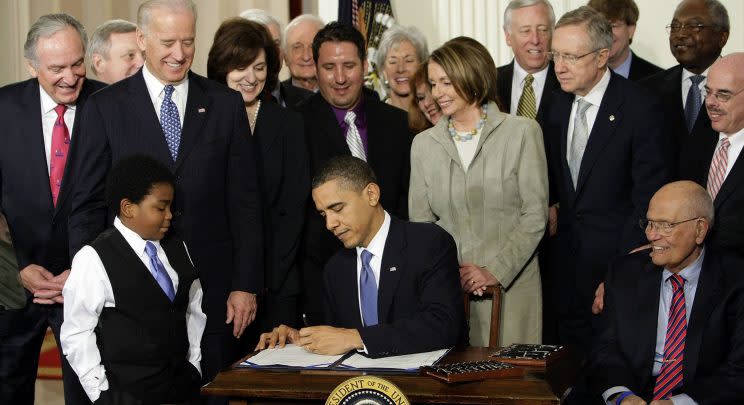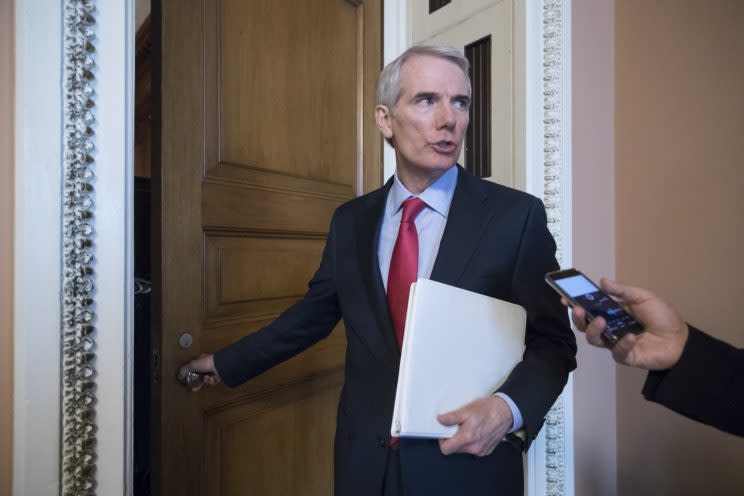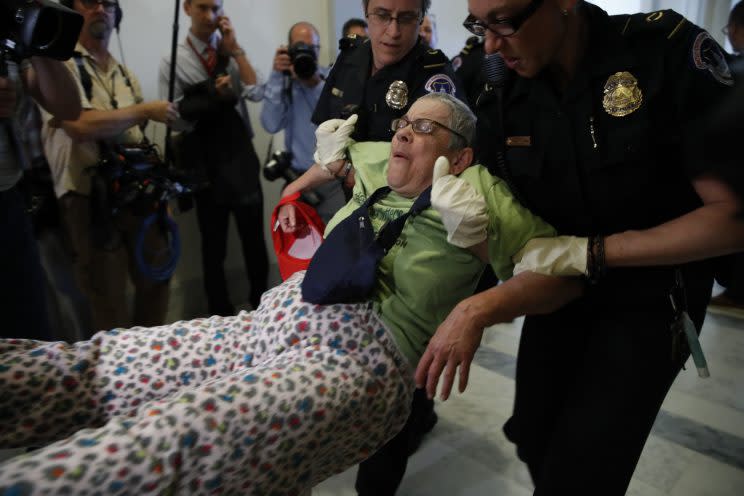Health Care Declassified No. 4: Was the Obamacare process really more transparent?

Yahoo News peeks behind the curtain of secrecy surrounding the Republican health care bill to learn what we can about what it may contain. We’ll combine our own reporting with the best insights from around the Internet to give you the latest on the future of health care in America.
~
Now that Republicans have formally introduced their version of a proposal to repeal Obamacare, their Democratic colleagues are ramping up the opposition into overdrive.
One of the most popular attacks from Democrats on the entire process has been that both the House and Senate versions of the American Health Care Act were written in secrecy, whereas their own efforts to pass Obamacare allowed for committee hearings, public comment and a robust amendment process.
Remarks like these from Sen. Claire McCaskill, D-Mo., are typical.
“Let me just say, I watched carefully all of the hearings that went on [when Obamacare was passed],” McCaskill said. “I was not a member of this committee at the time, although I would have liked to be. Sen. [Chuck] Grassley was the ranking member. Dozens of Republican amendments were offered and accepted in that hearing process.”
McCaskill then contrasted that process with the current attempts by congressional Republicans to roll back Obamacare.
“We’re not even going to have a hearing on a bill that impacts one-sixth of our economy. We’re not going to have an opportunity to offer a single amendment,” she continued. “It is all being done with an eye to try to get it by with 50 votes and the vice president.”
But was the process in 2009 and 2010, when Obamacare was passed, really transparent? And how will it compare to what we will see next week, when Senate Majority Leader Mitch McConnell, R-Ky., hopes to have a vote on the repeal proposal?
The biggest differences between the Obamacare and AHCA processes is in the committee hearing process. While Republicans held a small number of meetings in the House on the AHCA and health care reform, no such hearings have been held on the Senate side.

This contrasts with how Obamacare was constructed, where Congress held more than 30 hearings on health care in the year before the bill was first introduced in the House in June 2009.
Once the bill was introduced, committees continued their work examining and modifying the bill. On the Senate side, scores of hearings were held in the finance and health, education, labor and pensions committees. In the latter alone, the markup period, when amendments can be proposed, considered and adopted, stretched for over a month and more than 500 amendments were made.
These efforts also continued in the finance committee and was, at times, a bipartisan effort. A group of three Democratic lawmakers, Sen. Max Baucus, D-Mont., Sen. Jeff Bingaman, D-N.M., and Sen. Kent Conrad, D-N.D., elected to work with three of their Republican colleagues, Sen. Chuck Grassley, R-Iowa, Sen. Mike Enzi, R-Wyo., and Olympia Snowe, R-Maine, to form a coalition informally dubbed “the gang of six.”
While no formal legislation came out of the gang of six’s efforts, many of their ideas were incorporated into the committee’s version of the bill, which Snowe even voted for in committee. All in all, that committee considered 564 amendments.
But then Senate Majority Leader Harry Reid, D-Nev., also engaged in some legislative maneuvering that Democrats now are conveniently forgetting. After disparate bills emerged from the finance and HELP committees, Reid worked behind closed doors to merge the two proposals, unveiling his own bill on Nov. 18, 2009 before submitting it to the Congressional Budget Office for analysis.
In order to bring it to the Senate floor more easily, Reid also attached the text of the health care measure to an unrelated bill modifying a tax credit used by veterans, skirting normal procedure. The debate on the Senate floor was the second-longest consecutive session in Senate history and amendments from both parties were considered and voted on during that time.

But John Cannan, who works as a researcher and librarian at the Drexel University School of Law and who wrote a thorough legislative history of Obamacare, notes that the extensive debate was an effort by Reid to buy himself time to finalize the bill. Cannan also said that while over 500 amendments were offered on the floor, many of them were technical and did not alter the bill meaningfully.
“This number is deceptive,” Cannan told the Washington Post, adding that a “tiny fraction” of those amendments were relevant to the bill’s final passage.
Republicans at the time said the process lacked transparency.
“Americans are right to be stunned — because this bill is a mess,” McConnell said in 2009. “And so was the process that was used to get it over the finish line. Americans are outraged by the last-minute, closed-door, sweetheart deals that were made to gain the slimmest margin for passage of a bill that’s about their health care.”
These comments, and others like them, have been used against McConnell to decry the Republicans secretive process with their version of the AHCA. And while Reid and Senate Democrats used back-room negotiations and legislative maneuvers to pass Obamacare, they also held scores of hearings and markup sessions. And as the gang of six shows, there were also genuine bipartisan efforts — even if those eventually went by the wayside. Hundreds of Republican amendments were also considered and adopted, something which seems unlikely to happen this time around.
Overall, those committee hearings, as well as the more methodical time frame used by Democrats, are the starkest differences between 2009 and the present.
_____
Paul explains refusal to support GOP health care bill

One of the four GOP senators who vowed not to support the GOP’s new health care bill in its present form has shed light on what changes would be necessary for the Better Care Reconciliation Act to earn his vote.
In an appearance on MSNBC’s “Morning Joe” on Friday, Sen. Rand Paul, R-Ky., outlined the provisions that he finds unacceptable.
“I want the bill to look more like a repeal bill,” Paul said. “I promised people I was going to repeal it, I didn’t promise people I was going to replace it with a federal program of bailing out insurance companies.”
Paul also criticized the bill for not eliminating Obamacare’s protections of people with preexisting conditions, for subsidizing insurance premiums, and not doing enough to privatize the health care market.
“I can summarize the health care cost problem in one sentence, and we don’t address it,” Paul said. “The one sentence is: ‘The reason capitalism doesn’t work in health care is that the consumer is disconnected from the product.’ Consumers do not make decisions based on price in health care.”
Paul also proposed that the bill get rid of Obamacare regulations on insurance companies to “legalize inexpensive insurance.” Paul claimed that with less regulation, insurers could offer plans with fewer benefits that could cost as little as one dollar a day.
Should the bill gain Paul’s support during the brief amendment process, Senate Republicans would only need two more votes to pass the bill. Mike Lee, R-Utah; Ted Cruz, R-Texas; and Ron Johnson, R-Wis., have also said they cannot support the bill in its current form. — Taylor Rogers
_____
Moderate senators wary of impact on Medicaid and Planned Parenthood

Meanwhile, more moderate Republicans have reservations about the bill’s provisions rolling back Medicaid expansion and defunding Planned Parenthood.
Sen Rob Portman, R-Ohio, is among the members who have advocated preserving the Medicaid expansion in Obamacare. To appease this group, the bill begins phasing out the expansion in four years rather than three years, as previously discussed in negotiations.
But other changes to the program may still pose problems. Sen. Dean Heller, R-Nev., said Friday that he would not support the bill barring changes that help states like his own which have embraced Medicaid expansion.
“This bill is not the answer, and in its current form I will not support it,” Heller said, adding that it “will mean a loss of coverage for millions of Americans and many Nevadans.”
A spokesperson for Sen. Susan Collins, R-Maine, said the senator was reviewing the legislation and would wait to see the Congressional Budget Office’s report, which is expected to be available early next week.
Another issue is the bill’s defunding of Planned Parenthood for a year. Collins has previously said that “it is a mistake” to attach funding for the health care provider to the bill, and another lawmaker, Sen. Lisa Murkowski, R-Alaska, reportedly pledged to a constituent that she would not vote to defund Planned Parenthood. Both senators reiterated those stances Thursday.
But some conservative Republican lawmakers in both the Senate and the House may bail if the Planned Parenthood provisions are dropped. The House bill, called the American Health Care Act, also defunded Planned Parenthood, and it is unclear whether many lawmakers there would support a bill that did not cut funding for the group.
Other members may object to the funding the bill would allocate to combat opioid abuse. The Senate legislation provides $2 billion in 2018 for grants to the states. That is a fraction of the amount sought by some lawmakers, including Republicans. Portman and Sen. Shelley Moore Capito, R-W.Va., asked for more than 20 times that amount, $45 billion.
Capito said in a statement she was reviewing the bill and examining whether it would provide access to care for “those struggling with drug addiction.”
Read more about potential opposition to the proposal here.
-Andrew Bahl
_____
Police drag protesters away from McConnell’s office in ‘die-in’ against Medicaid cuts

Fearing that Senate Republicans’ Better Care Reconciliation Act’s cuts to Medicaid would prevent millions of low-income Americans from accessing life-saving care, activist group ADAPT dramatized what those deaths could look like — in front of Majority Leader Mitch McConnell’s office doors.
Capitol police were then forced to drag away dozens of protesters who were lying on the floor feigning death.
According to ADAPT’s website, the group planned the “die-in” to protest the effect the bill’s cuts to Medicaid could have on Americans with disabilities.
Protesters shouted, “I’d rather go to jail than die without Medicaid,” according to a statement on the group’s website.
Senate Republicans released a discussion draft of the bill on Thursday. It is expected to be voted on early next week. — Taylor Rogers
To see a slideshow of photos from the protest, click here.
_____
Medical groups diagnose GOP health care bill: It’s not well

In addition to outrage from across the aisle, the Better Care Reconciliation Act of 2017 was also met with criticism from medical advocacy groups across the country, including the American Medical Association, the American Association of Retired Persons, the American Academy of Pediatrics and the American Hospital Association.
While many of the groups support reforming Obamacare, several have stated that both the Better Care Reconciliation Act and its predecessor, the House’s American Health Care Act, would make the problems of the nation’s health care system worse.
“Not only would the AHCA eliminate health insurance coverage for millions of Americans, the legislation would, in many cases, eliminate the ban against charging those with underlying medical conditions vastly more for their coverage,” said American Medical Association President Andrew W. Gurman in a statement.
Read the full story here. — Taylor Rogers
_____
Read more from Yahoo News:
Senate GOP health care bill looks a lot like ‘mean’ House one
In just a year, Republicans became far more skeptical of claims of racism
White House concedes Russia meddled in campaign, but denies it changed the result
Lance Armstrong opens up about his comeback — as a podcaster
Photos: ‘Die-in’ protesters dragged away from McConnell’s office


